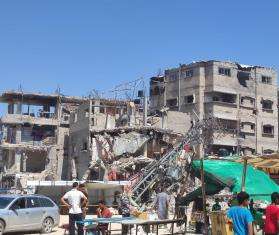MSF deeply concerned by the current relocation of refugees to Ifo 3 camp in Dadaab.
MSF is deeply concerned by the relocation of Somali refugees in Dadaab to the Ifo 3 camp, a move marked by a pronounced lack of transparency, planning, and consultation.
The medical humanitarian organization Doctors Without Borders/Médecins Sans Frontières (MSF) is deeply concerned by the relocation of Somali refugees in Dadaab, in northeastern Kenya, to the Ifo 3 extension camp. The relocation, which began yesterday under the auspices of the United Nations High Commission for Refugees (UNHCR), has been carried out with little transparency or consultation with other agencies on the ground and the refugee community itself.
Each day, some 200 families are being relocated to Ifo 3, a camp with few basic services, including water and sanitation. It is expected that the camp will hold a total of 60,000 refugees, which is 20,000 more people than it was originally designed for. NGOs were alerted only last Friday of the relocation exercise, and although water is currently being trucked to the new camp and latrines are rapidly being dug, the camp does not at present meet the minimum humanitarian standards.
Furthermore, this camp has no hospital structure, which will force MSF to refer patients in need of hospitalization or inpatient therapeutic feeding to either the Dagahaley camp or Ifo camp hospitals, both of which are already operating beyond full capacity because of widespread malnutrition and other medical issues among the rapidly swelling refugee population.
Meanwhile, just a few kilometers away lies Ifo 2, a camp that was due to open last November and is already equipped with boreholes, latrines and showers, electricity, some shelter, and schools. MSF calls on the Government of Kenya and the UNHCR to ensure the immediate relocation of refugees to Ifo 2 as announced by the government 12 days ago.
The matter is urgent. Refugees fleeing drought and conflict in Somalia continue to arrive in large numbers in Dadaab. Last week alone, 5,117 new refugees arrived in Dadaab, bringing the total of new arrivals since January to 81,463 and the total number of refugees in Dadaab to 387,893 (The camps in the area were initially built to hold 90,000 people). Many of these refugees must remain on the outskirts of the overcrowded camps, where they are not receiving adequate assistance and are being forced to contend with delays in registration and access to food, water, and shelter.
MSF is currently treating more than 2,400 children in its ambulatory therapeutic feeding program in Dadaab and 138 in its inpatient therapeutic feeding center. It also has 5,047 children with moderate acute malnutrition enrolled in the supplementary feeding program.
MSF has been working in the Dagahaley camp in Dadaab since March 2009, providing medical care including surgery and maternal health services in a 170-bed hospital and offering vaccinations, antenatal care, and mental healthcare in six health posts in the camps and outskirts. In addition, since earlier this year MSF has been working on the outskirts of Ifo camp, providing primary health care and nutritional assistance to the new arrivals for whom there is no room inside the camp.




